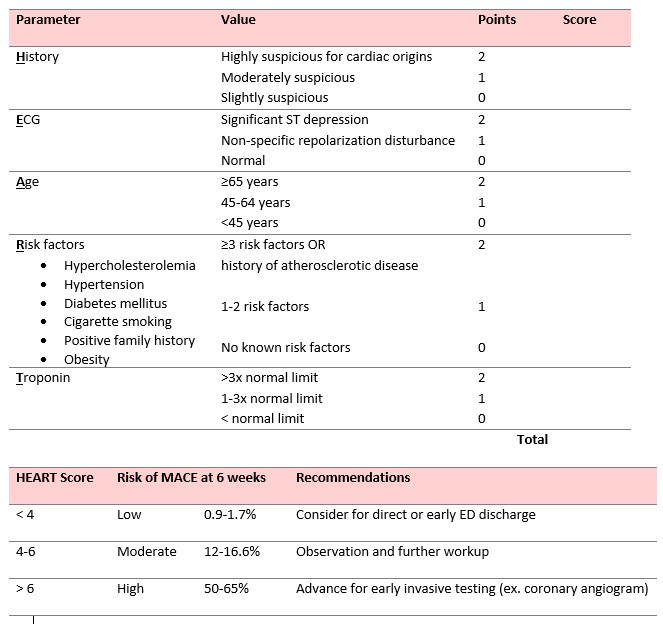HEART Score
Cardiovascular
Context
- Approximately 80% of patients presenting to an ED with chest pain can be evaluated safely and ultimately discharged home.
- The HEART Score is a well-validated risk stratification tool that allows earlier discharge of adult (> 21 years) chest pain patients concerning Acute Coronary Syndrome (ACS).
- HEART = History, ECG, Age, Risk factors, Troponin.
- It calculates the risk of a Major Adverse Cardiac Event (MACE)* within 6 weeks to identify.
- MACE = all-cause mortality, coronary revascularization, or myocardial infarction.
Diagnostic Process
HEART Score

- Both troponin and high-sensitivity troponin assays can be used with the HEART score, but a 2 – 3 hour high-sensitivity delta that is negative for ischemia and a low-risk HEART score decreases the MACE rate to 0.3%.
- Limitations of the HEART score:
- Subjective variation in scoring.
- A patient can have an elevated troponin and still be low-risk.
- ECG findings can be dynamic.
Clinical Pitfalls
- Applying the HEART score to the wrong patient population.
- Do not use in patients:
- Those < 21 years,
- ST-Elevation Myocardial Infarction (STEMI),
- Hypotensive,
- Life-expectancy < 1 year.
- Failure to consider further investigate patients with an elevated troponin in isolation (absence of any other risk factors) but have a low HEART score. Elevated troponin is evidence of myocardial cell death and should warrant investigation.
Quality Of Evidence?

High
We are highly confident that the true effect lies close to that of the estimate of the effect. There is a wide range of studies included in the analyses with no major limitations, there is little variation between studies, and the summary estimate has a narrow confidence interval.
Moderate
We consider that the true effect is likely to be close to the estimate of the effect, but there is a possibility that it is substantially different. There are only a few studies and some have limitations but not major flaws, there are some variations between studies, or the confidence interval of the summary estimate is wide.
Low
When the true effect may be substantially different from the estimate of the effect. The studies have major flaws, there is important variations between studies, of the confidence interval of the summary estimate is very wide.
Justification
Several randomized control trials have validated the HEART score as a safe and effective clinical decision-making tool for evaluating patients with ACS. Studies have shown it has a negative predictive value >98% for those who have a low-risk score.
Related Information
Reference List
Related Information
OTHER RELEVANT INFORMATION
Relevant Resources
RELEVANT RESEARCH IN BC
Cardiovascular EmergenciesRESOURCE AUTHOR(S)

DISCLAIMER
The purpose of this document is to provide health care professionals with key facts and recommendations for the diagnosis and treatment of patients in the emergency department. This summary was produced by Emergency Care BC (formerly the BC Emergency Medicine Network) and uses the best available knowledge at the time of publication. However, healthcare professionals should continue to use their own judgment and take into consideration context, resources and other relevant factors. Emergency Care BC is not liable for any damages, claims, liabilities, costs or obligations arising from the use of this document including loss or damages arising from any claims made by a third party. Emergency Care BC also assumes no responsibility or liability for changes made to this document without its consent.
Last Updated Jun 05, 2021
Visit our website at https://emergencycarebc.ca
COMMENTS (0)
Add public comment…


POST COMMENT
We welcome your contribution! If you are a member, log in here. If not, you can still submit a comment but we just need some information.